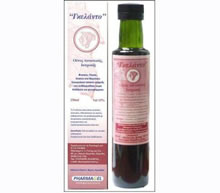
Λεξικό .. Aspirin induced asthma
Aspirin induced asthma
NSAIDs-including aspirin (ASA)-that inhibit cyclooxygenase (COX)-1 induce nonallergic hypersensitivity reactions consisting of attacks of rhinitis and asthma. Such reactions occur exclusively in a subset of asthmatic patients who also have underlying nasal polyps and chronic hyperplastic eosinophilic sinusitis. We now refer to their underlying inflammatory disease of the entire respiratory tract as aspirin-exacerbated respiratory disease [1]. Aspirin and the non steroid antiinflammatory drugs except corticosteroids can precipitate asthmatic attacks in some patients with nasal polyps.
The incidence of nasal polyp found in aspirin-induced asthma ranges from 60% to 100%. The asthmatic attacks can be severe and life-threatening. Histologic findings on the polyp show tissue eosinophilia in all patients with aspirin intolerance [2]. Electron microscopically the polyps may be demonstrated disappearance of crystalloid electron-dense cores in granules of most eosinophiles, although the amorphous matrix of the granules remains [3]. (See Aspirin intolerance, Aspirin sensitivity).
References
1. Stevenson DD. Aspirin sensitivity and desensitization for asthma and sinusitis. Curr Allergy Asthma Rep. 2009 Mar;9(2):155-63
2. Ogino, S., et al: Aspirin-induced asthma and nasal polyp. Acta Otolaryngol. (Stocch) (Suppl) 1986; 430:21-27.
3. Sasaki Y, and Nakahara, H.: Granule core loss in eosinophils from a patient with aspirin-induced asthma: an electron microscopic study. Annals of Allergy. Vol. 63, Oct. 1989, pp. 306-308.
Γκέλης Ν.Δ. - Λεξικό Αλλεργίας - Εκδόσεις ΒΕΛΛΕΡOΦΟΝΤΗΣ - Κόρινθος 2013
Gelis Ν.D. - Dictionary of Allergies - VELLEROFONTIS Publications - Corinth 2013




